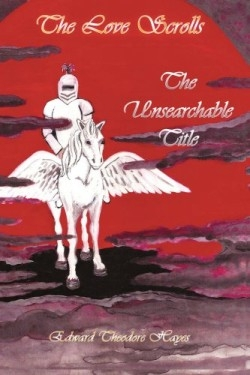The Love Scrolls
The Unsearchable Title
By day Edward Theodore Hayes of New Jersey works as a retail manager in a national department store. Otherwise he toils diligently as a poet having authored four books in the Love Scroll series. This slim volume The Unsearchable Title is the second in the series. The book is an admirable feat of its kind flaws and all and holds appeal for readers with a penchant for the form structure and trappings of the classical literary ballad but with variations.
The classical story and tone emanate from the references to Greek mythology (Pegasus Eos Helios even Sheol as Hades or Hell) and the struggle of a Knight to overcome forces of evil win the heart of a fair maiden and find God on earth and throughout the universe. The epic searches are recounted in seven aptly titled scrolls each containing seven poems. Most of the poems are composed of rhyming quatrains except for the rhyming couplets that end most of the forty-nine poems. The metre however is much freer but with this freedom comes stumbles of verbiage such as: “And here we reside where all our dreams come true your dream of a Knight in shining armour coming to your rescue / And my dream that has come true of being that Knight in shining armour that comes to rescue you.”
Sometimes as well a reached-for rhyme jars as in “Tranquility” with its eight end-line rhymes of are/far/scar/afar/bar/thar/insofar/star. The discordance of “thar” as a variation for “there” occurs elsewhere as well. One poem’s title “Love is Gonna Win” is too colloquial for the overall tone of the collection while the title “Flight of a Knight” is too flip. The latter however can also be seen as an example of Hayes’ humour which takes full and fanciful flight in the poems “Bridal” and “Unbridled” with their pun on “bridal” and “bridle.” The title of the final poem in the book “A Knight’s Midsummer Dream” is a clever play too on Shakespeare’s A Midsummer Night’s Dream.
While there are lighter and lyrical poems such as “Picnic” and “Sunny Day’s Revenge” others such as “Three Siblings” contain such serious thoughts as: “When in the final battle of good and evil and all the stars of heaven fall / They shall be sharers to inherit a new earth and heaven and all.” And in “Shared Vision” readers are asked to consider: “Don’t you know that it is this way faith throughout the earth will be restored? / It is such visions and dreams as this that shall awaken mankind to the coming of the Lord.”
There is energy and emotion in these poems but they are best read in single doses to offset the repetitive constraints of a frequently forced rhyme that inhibits the flow of truly imaginative concepts and the natural rhythm of the language. The poetic potential is there; it needs to be released.
Disclosure: This article is not an endorsement, but a review. The publisher of this book provided free copies of the book and paid a small fee to have their book reviewed by a professional reviewer. Foreword Reviews and Clarion Reviews make no guarantee that the publisher will receive a positive review. Foreword Magazine, Inc. is disclosing this in accordance with the Federal Trade Commission’s 16 CFR, Part 255.

